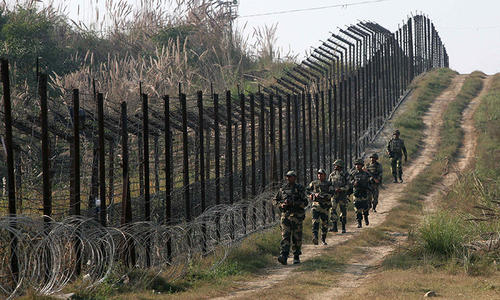THE relative rarity in recent times of good news on the Pakistan-India front makes it all the more welcome when the two states reach an unexpected agreement.
The decision to restore a ceasefire across the Line of Control and Working Boundary is significant.
Violence across the LoC and Working Boundary has been unacceptably frequent and intense in recent weeks, constituting a pattern of ebb and flow in the exchange of fire and the trading of allegations between India and Pakistan that had threatened to spiral out of control.
With a month-long ceasefire declared by the Indian government inside occupied Kashmir seemingly already in effect, and now the militaries on both sides pledging to “exercise restraint” in case of a flare-up in violence along the LoC and Working Boundary, the oppressed people of India-held Kashmir may get a respite from hostilities while border populations in Azad Kashmir and the Working Boundary can also look forward to a resumption of the 2003 ceasefire that had frayed.
Alleviating the suffering of the people of the region and protecting them from violence should be a priority for peacemakers in both states and the Kashmir region too.
A decision to uphold the 2003 agreement is also significant because it suggests both pragmatism and recognition of the need to protect hard-won gains in the long and tumultuous road to bilateral normalisation and eventual peace.
After Pakistan and India engage in a period of low-level conflict or verbal warfare, subsequent attempts at normalising ties can sometimes veer towards unnecessary new approaches and ideas.
The 2003 ceasefire was historic and, as both Pakistan and India have once again acknowledged, deserves to be kept in place because it is a sensible arrangement and there is no clear, better alternative.
The agreement announced on Tuesday immediately after the DGMOs of the two countries used a special hotline to speak to each other suggests that the Pakistan-India back channel may be active and that the national security advisers of the two countries continue to either meet or discuss confidence-building measures.
The agreement coming on the eve of the dissolution of the National Assembly indicates that quiet back-channel diplomacy and security contacts could continue through the term of the caretaker dispensation rather than such engagement being blocked until an elected government assumes office in Pakistan.
Positive signals sent by the Pakistani military leadership in recent months appear to have been received in India and a willingness to reciprocate shown.
As ever, there is no room for complacency, but the moment should be seized by both sides to try and effect further positive change.
Among the so-called low-hanging fruit and issues that can help improve the atmosphere in which dialogue can be considered between the two countries, the issue of prisoners offers the possibility of quickly creating goodwill.
Whatever the issue chosen to help reopen dialogue, the moment should be built on quickly.
Published in Dawn, May 31st, 2018













































